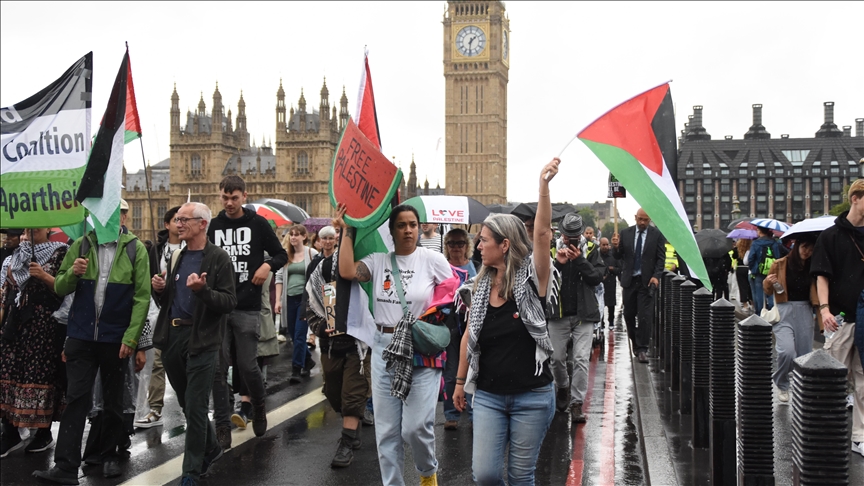LONDON
More than 100 people have been arrested across the UK in connection with demonstrations related to the proscribed group Palestine Action, as protests continue into a third week since the organization was designated a terrorist group by the UK government.
Protests are being held in multiple cities across the country as the crackdown on support for the banned group intensifies.
The Metropolitan Police said Saturday that 55 arrests were made in Parliament Square under the 2000 Terrorism Act after they allegedly displayed signs supporting Palestine Action.
Deputy Assistant Commissioner Ade Adelekan, who is leading the Met’s policing operation this weekend, said in a statement: “Nobody will be committing an offence by simply supporting the Palestinian cause, taking part in the march or carrying flags, banners or other signs providing they don’t stray into hate speech or other offences.
“However, those who see this as an opportunity to test the limits of the law by expressing support for Palestine Action, whether at a standalone protest or as part of the Palestine Coalition protest, will likely be committing an offence and will very likely be arrested.”
Police officers were seen surrounding demonstrators near the Mahatma Gandhi statue in Parliament Square, where signs were held reading “I oppose genocide, I support Palestine Action.”
Officers confiscated signs, searched bags, and led some individuals away in handcuffs. Others were carried from the scene.
‘Depends on the circumstances’
“We have said before that whether chants cross the line from free speech to a potential criminal offence depends on the specific circumstances,” Adelekan added.
“For example, there will be words that when chanted in the middle of the Palestine Coalition march, and not directed at individuals who might be caused harassment, alarm or distress as a result, might not lead an officer to reasonably suspect an offence has been committed,” he noted.
“But directing the same words at a group of people for whom the words would very likely cause harassment, alarm or distress, could well give rise to grounds for arrest.”
Demonstrations took place on Saturday in London, Manchester, Edinburgh, Bristol, and Truro as part of a campaign coordinated by the group Defend Our Juries.
Greater Manchester Police said 16 people were arrested and remain in custody for questioning, while Avon and Somerset Police confirmed 17 arrests during a protest in Bristol.
In Cornwall, Devon and Cornwall Police said eight people were arrested at a protest held inside Truro Cathedral.
About 30 protesters had gathered for what the force described as a “peaceful” Defend Our Juries demonstration.
“A number of placards which were contrary to the law remained on display despite police advice,” the force said. “Eight people, two men and six women, were arrested on suspicion of offences under section 13 of the Terrorism Act 2000. They remain in police custody.”
Police Scotland said a man was arrested in Glasgow on Friday “for displaying a sign expressing support for a proscribed organization.”
More than 70 people were arrested at similar demonstrations across the UK last week, where references to Palestine Action were allegedly made.
On X, Defend Our Juries said: “The UK government is complicit in Israel’s genocide against Palestinians. They are attempting to silence those who expose this complicity.”
– Palestine Action ban
The protest came amid renewed scrutiny of the government’s decision to ban Palestine Action, which was formally outlawed as a terrorist organization on July 5.
The group, known for its direct action campaigns targeting companies linked to the arms trade and Israel’s military, had recently made headlines after activists broke into the Royal Air Force base at Brize Norton and defaced military aircraft with spray paint.
Human rights groups have warned that the ban risks criminalizing peaceful protest and silencing dissent, while supporters of the ban argue that the group’s methods amount to unlawful and dangerous activity.
A legal challenge to the ban is expected on Monday, when the group’s co-founder, Huda Ammori, will ask the High Court for permission to contest it.
Human rights groups, cultural figures, and hundreds of lawyers have criticized the ban as draconian, warning it sets a dangerous precedent by conflating protest with terrorism.
